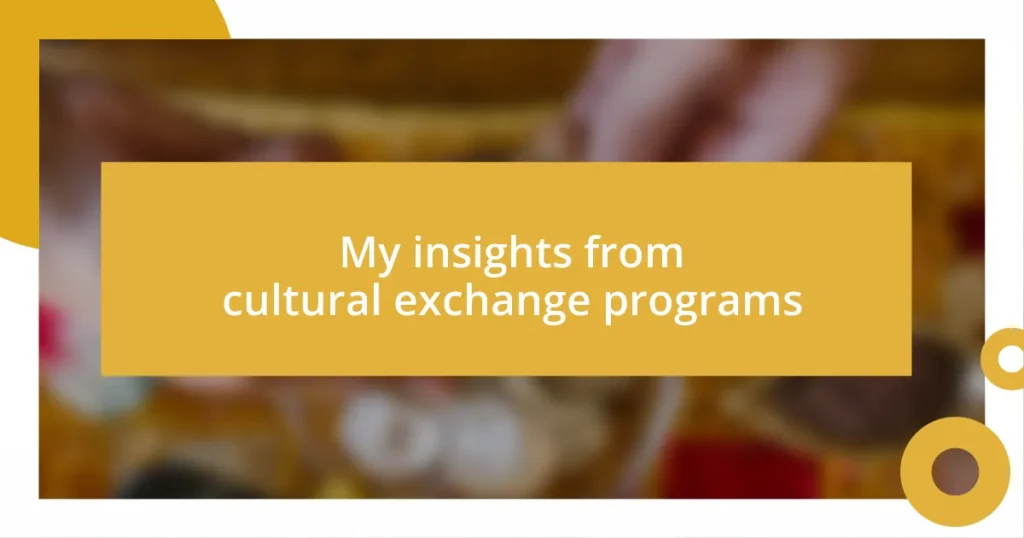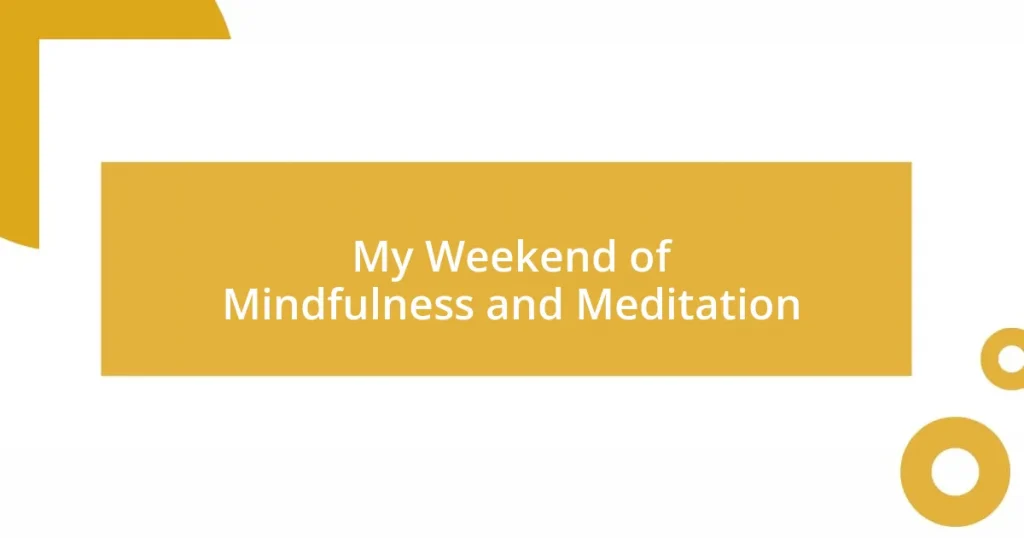Key takeaways:
- Cultural exchange programs foster personal growth, enhance empathy, and improve language skills through immersive experiences.
- Networking during exchanges can lead to lasting friendships and professional connections, providing access to mentorship and collaboration opportunities.
- Challenges like language barriers and homesickness are common, but they teach patience, creativity in communication, and the importance of emotional adaptation.
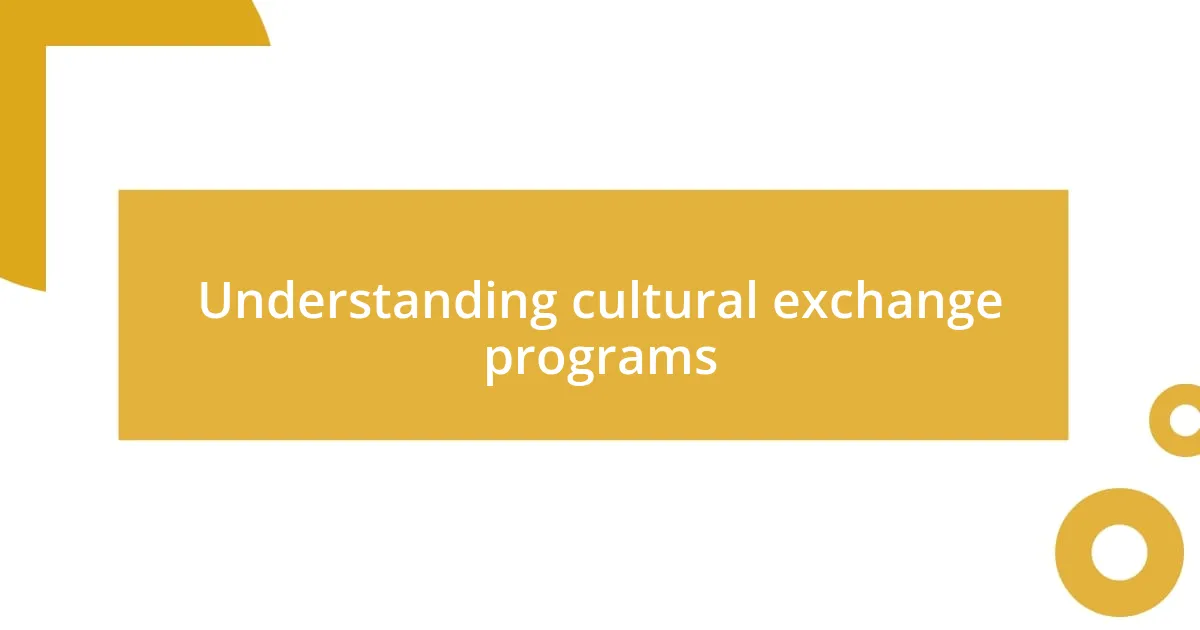
Understanding cultural exchange programs
Cultural exchange programs offer a unique opportunity to bridge the gap between diverse groups of people. When I first participated in one during my college years, I remember feeling an exhilarating mix of excitement and nervousness. How often do we get a chance to step into someone else’s shoes, to experience their world firsthand?
These programs aren’t just about travel; they’re about forming connections that transcend borders. I met a family in France who graciously invited me into their home for dinner. As we shared stories over a meal, I realized how similar our hopes and dreams were, despite our different backgrounds. Isn’t it fascinating how food can serve as a universal language that brings people together?
Engaging with different cultures reshapes our perspectives and helps us grow. Reflecting on my own journey, I found myself questioning preconceived notions, embracing new ideas, and expanding my understanding of community. Have you ever paused to think about how such experiences can mold our identities? It’s truly remarkable how cultural exchange can transform not just our views, but also our sense of belonging.
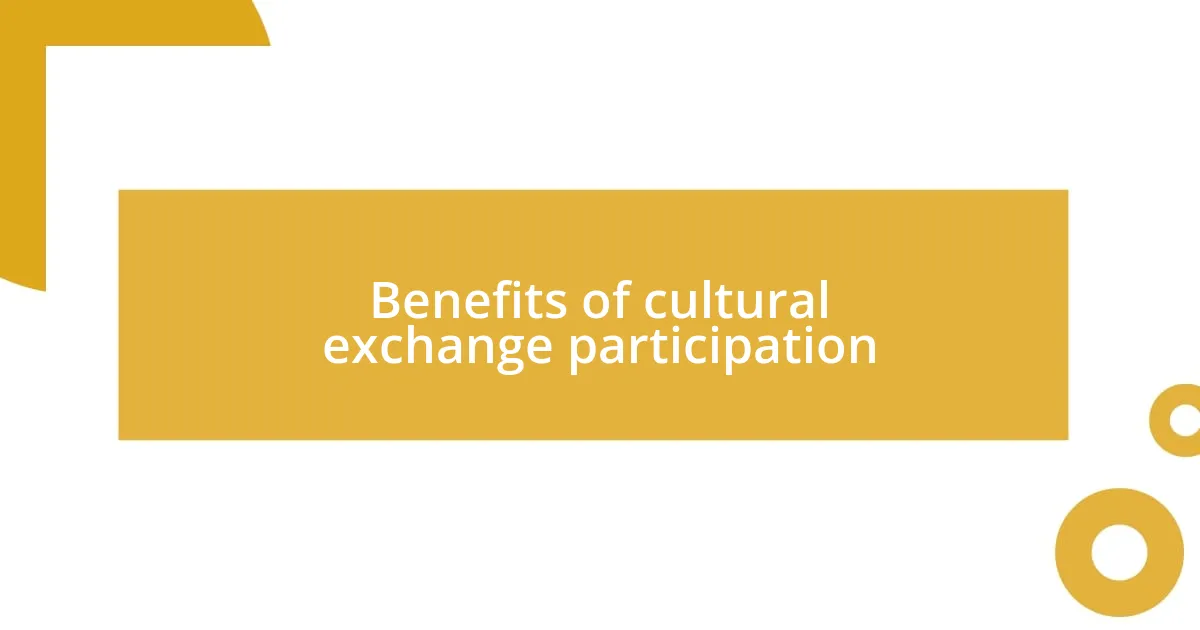
Benefits of cultural exchange participation
Participating in cultural exchange programs opens the door to personal growth in ways I never anticipated. I remember an event during my exchange where I engaged in a traditional dance from my host country. Stepping out of my comfort zone was nerve-wracking but exhilarating. The fear quickly melted away as I connected with others, celebrating our differences while sharing joyful moments. It reinforced my belief that facing our fears can lead to incredible personal development.
Here are some specific benefits of cultural exchange participation:
- Enhanced Empathy: By experiencing life from another’s perspective, I found myself feeling a deeper understanding of global issues and human experiences.
- Language Skills: Immersing yourself in a host culture provides an excellent opportunity to learn or improve language skills. I became proficient in phrases that are often lost in textbooks, like local idioms and expressions.
- Networking Opportunities: I built lasting friendships and professional connections, which continue to benefit me to this day, both personally and in my career.
- Resilience and Adaptability: Navigating unfamiliar environments taught me to adapt quickly and embrace change, skills I apply in every aspect of my life.
- Cultural Awareness: Engaging deeply with another culture enriches one’s worldview and fosters respect for diversity, which I carry with me every day.
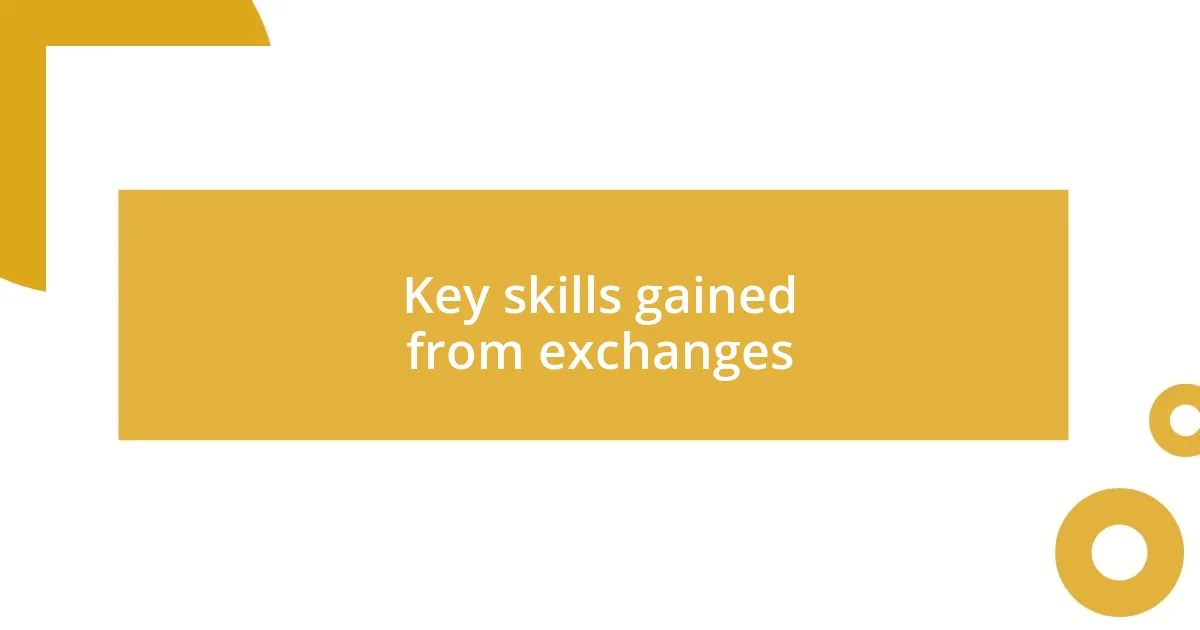
Key skills gained from exchanges
Taking part in cultural exchanges equips participants with invaluable skills that extend far beyond the experience itself. For instance, I vividly remember my initial struggle with the language barrier during my exchange in Spain. With each awkward attempt to communicate, I fostered not just language skills, but also invaluable patience and understanding. Language isn’t just about words; it’s about connecting with people on a deeper level.
Moreover, cultural exchanges teach us the importance of adaptability. When I moved through the bustling markets of Marrakech, I needed to think on my feet and embrace the unexpected. Each encounter with local vendors, each shift in plans, sharpened my ability to navigate unfamiliar situations. I believe this adaptability translates into resilience, a skill I utilize even today when faced with challenges in my professional life.
Finally, these programs cultivate a heightened sense of empathy. I recall a heartfelt conversation I had with a fellow exchange participant from Brazil about our families and childhoods. Despite our varied backgrounds, we discovered shared dreams and fears. This realization that we’re all interconnected has made me more compassionate and understanding of others’ experiences, an essential skill in today’s globalized world.
| Key Skill | Description |
|---|---|
| Language Proficiency | Improvement in language skills through immersion and real-life practice. |
| Adaptability | Ability to adjust to new environments and situations, enhancing resilience. |
| Empathy | Development of a deeper understanding of diverse perspectives and experiences. |
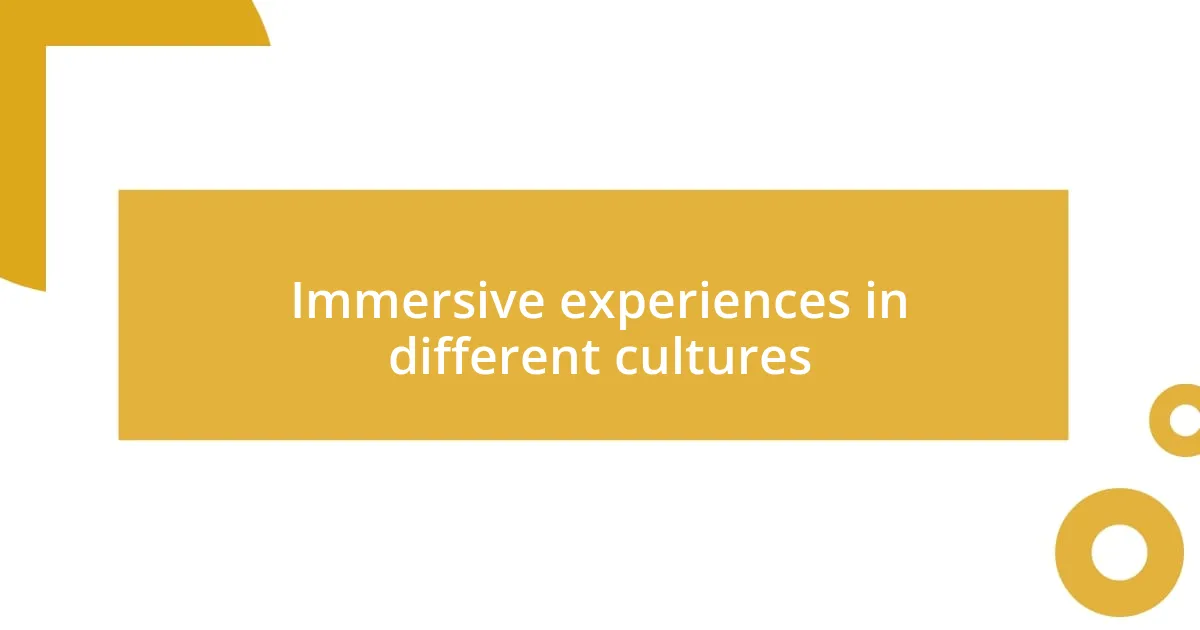
Immersive experiences in different cultures
Immersive experiences in different cultures truly transformed my view of the world. I recall a vivid night spent under the stars during a traditional festival in Bali, where the locals invited us to participate in their rituals. The backdrop of music, laughter, and the vibrant colors of the ceremonies made me feel like I was part of something larger than myself—an intricate tapestry of shared humanity. Have you ever felt that incredible connection, where time and place just fade away?
During another exchange, I had the chance to cook a traditional meal with a family in Mexico. As we chopped vegetables together, exchanging stories between our laughter, I learned how food traditions carry immense cultural significance, bridging gaps between generations. I realized that it’s not just about the ingredients but the love, history, and community they embody. Did you know that sharing a meal can foster deeper connections than merely conversational exchanges?
Reflecting on these experiences, I am continually amazed by the depth of understanding such immersions provide. Each interaction, each shared moment, enhances my appreciation for diversity. It’s incredible how stepping into someone else’s shoes—through their customs, traditions, and daily lives—can reshape our perspectives and beliefs. Have you considered how these immersive moments could change your worldview?
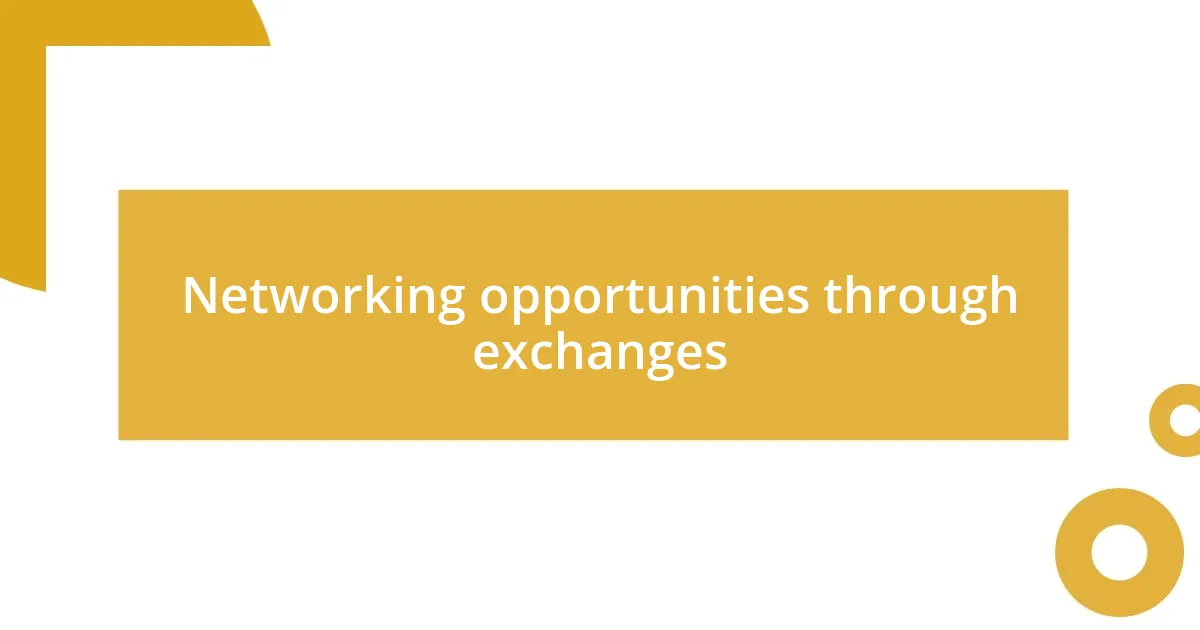
Networking opportunities through exchanges
Cultural exchange programs open a wealth of networking opportunities that can shape both personal and professional paths. I remember my time in Japan, where I met individuals from diverse countries, each bringing unique perspectives. It struck me how a simple exchange of contact information could lead to collaborations or friendships that span continents. Have you ever considered how a single connection could open doors to myriad possibilities?
Through these experiences, I’ve witnessed firsthand how networking goes beyond just professional gain; it’s about building genuine relationships. After a meaningful discussion with an Australian exchange participant about our respective fields, we found mutual interests that eventually led us to work together on a creative project. Strengthening these connections has enriched my understanding of global trends and practices in my industry. Isn’t it compelling how these relationships can flourish into something more impactful over time?
Another invaluable aspect of networking through exchanges is the access to mentors. During my stay in France, I connected with a local entrepreneur who took me under his wing. His insights on navigating the business landscape not only inspired me but also gave me a fresh outlook on pursuing my goals. Do you find it exhilarating that every conversation holds the potential to unlock new growth and learning opportunities?
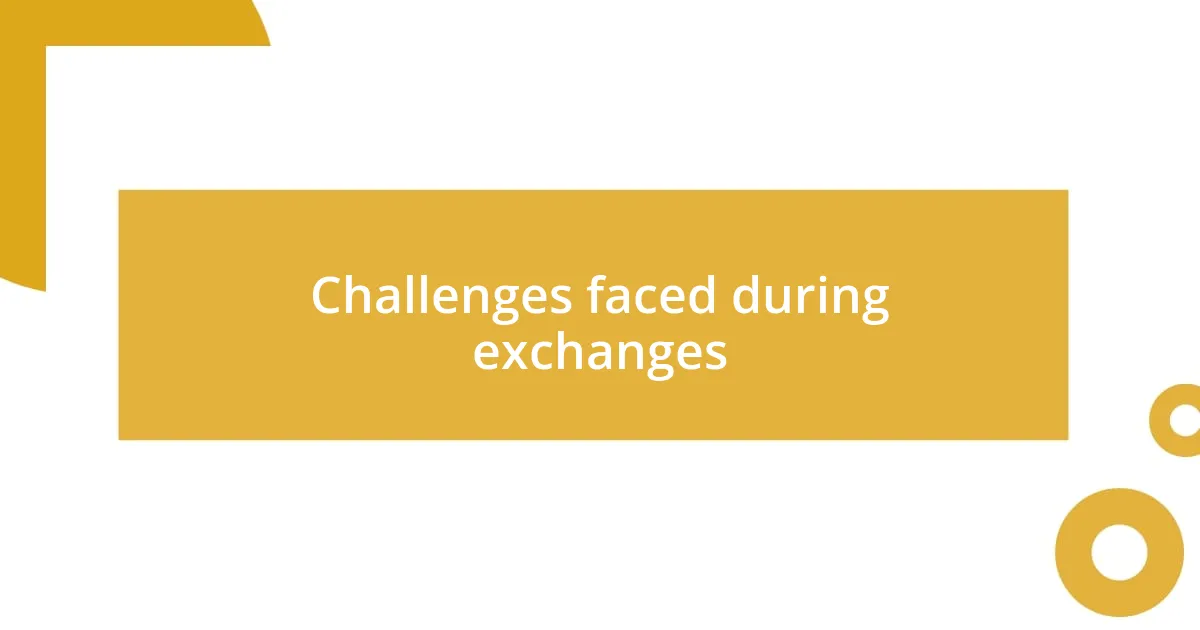
Challenges faced during exchanges
Navigating cultural exchanges isn’t always smooth sailing. I encountered language barriers that sometimes felt insurmountable. For instance, during my stay in Spain, I struggled to express myself clearly, often resorting to gestures and facial expressions. Isn’t it frustrating when you have so much to say but the words just won’t come? Those moments taught me the importance of patience and creativity in communication.
Another challenge that arose was homesickness. I vividly remember sitting alone in my room in Italy one evening, overwhelmed by a wave of nostalgia. It’s that bittersweet feeling when you love your new surroundings but miss the comfort of home. This experience reminded me that emotional adaptation is just as critical as cultural immersion. What strategies do you think could help manage such feelings during an exchange?
Additionally, adjusting to different social norms can be daunting. While participating in a group activity in South Korea, I felt hesitant due to my unfamiliarity with their customs. I quickly learned that in some situations, silence is a sign of respect—a concept that initially baffled me. Have you ever found yourself out of sync with the unspoken rules of a new environment? Embracing these differences not only challenged my assumptions but also deepened my understanding of varied perspectives.










